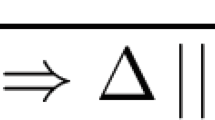Abstract
An extension of Myhill's theorem of automata theory, due to Ehrenfeucht et al. [4] shows that a subsetX of a semigroupsS is recognizable if and only ifX is closed with respect to a monotone well quasi-order onS. In this paper we prove that a similar extension of Nerode's theorem is not possible by showing that there exist non-regular languages on a binary alphabet which are closed with respect to a right-monotone well quasi-order. We give then some additional conditions under which a setX S closed with respect to a right-monotone well quasi-order becomes recognizable. We prove the following main proposition: A subsetX ofS is recognizable if and only ifX is closed with respect to two well quasi-orders<=1 and<=2 which are right-monotone and left-monotone, respectively. Some corollaries and applications are given. Moreover, we consider the family ℱ of all languages which are closed with respect to a right-monotone well quasi-order on a finitely generated free monoid. We prove that ℱ is closed under rational operations, intersection, inverse morphisms and direct non-erasing morphisms. This implies that ℱ is closed under faithful rational transductions. Finally we prove that the languages in ℱ satisfy a suitable ‘pumping’ lemma and that ℱ contains languages which are not recursively enumerable.
Similar content being viewed by others
References
Autebert, J.M., Boasson, L.: Transductions rationnelles. Applications aux languages algébriques. Paris: Masson 1988
Berstel, J.: Transductions and context-free languages. Stuttgart: Teubner 1979
Clifford, A.H., Preston, G.B.: The algebraic theory of semigroups vol. 1. (Math. Surveys Monogr., No 7) Providence, RI: American Methematical Society 1961
Ehrenfeucht, A., Haussler, D., Rozenberg, G.: On regularity of context-free languages. Theor. Comput. Sci. 27 311–332 (1983)
Eilenberg, S.: Automata, languages and machines, vol. A. New York: Academic Press 1974
Higman, G.H.: Ordering by divisibility in abstract algebras. Proc. London Math. Soc.3, 326–336 (1952)
Kruskal, J.: The theory of well-quasi-ordering: a frequently discovered concept. J. Comb. Theory Ser. A13, 297–305 (1972)
Latteux, M., Rozenberg, G.: Commutative one-counter languages are regular. J. Comput. Syst. Sci.29, 54–57 (1984)
Lothaire, M.: Combinatorics on words. Reading, Mass: Addison Wesley 1983
Luca, A., de, Varricchio S.: Finiteness and iteration conditions for semigroups. Theor. Comput. Sci.87, 315–327 (1991)
Luca, A. de, Varrichio, S.: Some regularity conditions based on well quasi-orders (Lect. Notes Comput. Sci., vol. 583, pp. 356–371) Berlin, Heidelberg, New York: Springer 1992
Restivo, A., Reutenauer, C.: Some applications of a theorem of Shirshov to language theory. Inf. Control,57, 205–213 (1983)
Simon, I.: Piecewise testable events (Lect. Notes Comput. Sci., vol. 33, pp. 214–222) Berlin, Heidelberg, New York: Springer 1975
Author information
Authors and Affiliations
Rights and permissions
About this article
Cite this article
de Luca, A., Varricchio, S. Well quasi-orders and regular languages. Acta Informatica 31, 539–557 (1994). https://doi.org/10.1007/BF01213206
Received:
Issue Date:
DOI: https://doi.org/10.1007/BF01213206




